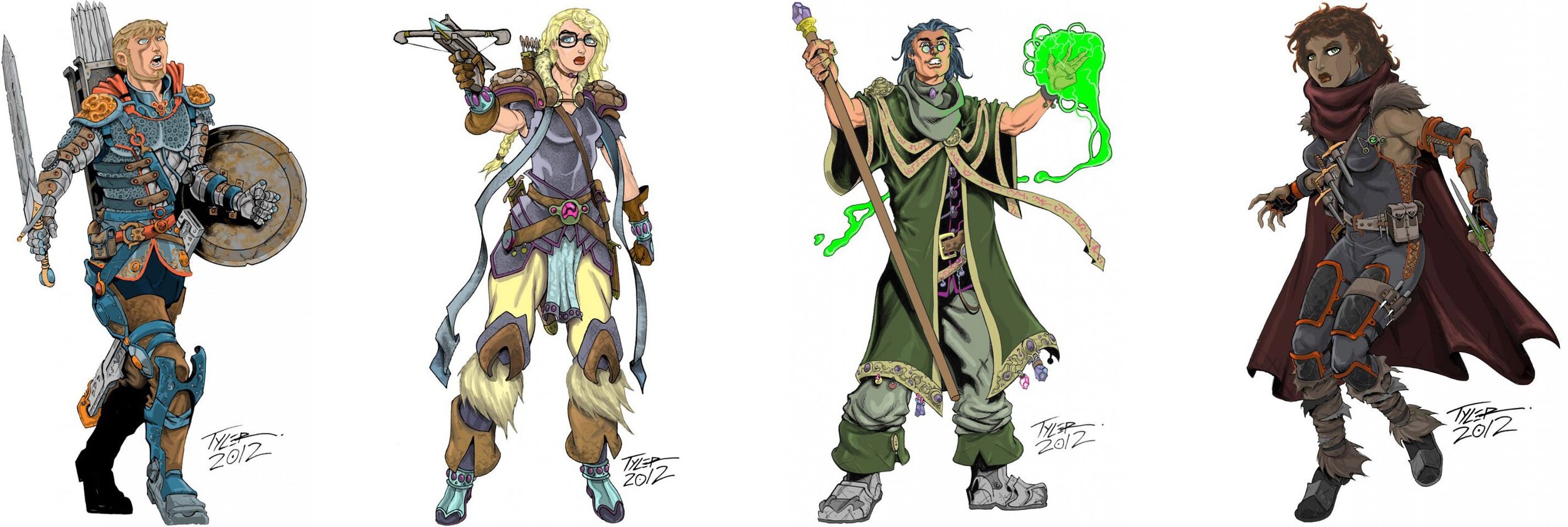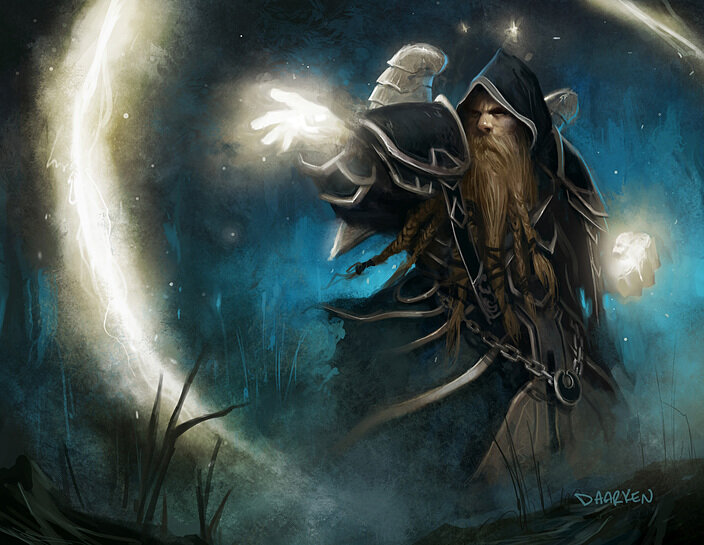From left to Right: Tank, Healer, Magic-User, and Explorer.
Your Dungeon Master calls you together to kick off the campaign with a session zero. After discussing the setting and their expectations for the table it comes down to the part that you’ve been waiting for, creating your character and your party. For the sake of this we will say there are four players, a pretty standard D&D party size wise. You all start blurting out what you want to play, and discuss the party composition. What is the party composition? The party composition, or party comp for short, is the combination of characters that make up a party. If you have played a RPG like Baldur's Gate, World of Warcraft, or Dragon Age, you know that there is a certain balance a party needs in order to be “successful” in the game. Now this is not to say an unbalanced party can’t be successful, or fun to be a part of, just that there is a lack of balance mechanics wise. In Dungeons and Dragons, this also depends heavily on the setting. A balanced party playing in the Black Sun setting will be drastically different than one playing in Eberron. As a rule we will assume your party is playing one of standard 5e campaigns. So what does a balance party composition look like? You can break the party down into four main categories; Tank/Front-line Fighter, Healer/ Support, Explorer/Investigator, and a Magic-User/ Glass Cannon. Some may argue a fifth category, the Face, but most times a Face character can fall into one of the above groups and isn't always necessary.
Tank/ Front-Line Fighter
This is the group that you will see up in front, holding the line as the tides of enemies crash against them. Barbarian, Fighters, and Paladins are the first that come to mind in this group. A solidly built Monk, Ranger, or Circle of the Moon Druid may also fall into this category. Having a high hit-point pool to soak up damage or being able to wear armor that makes them virtually unhittable is crucial. Additionally, you use your martial prowess to hack and slash at the enemies around you, or even have some magic powers to help with this task. Your job is to keep your enemies in front of you and hold the front lines, drawing the enemy to you and ensuring your squishier party members are safe behind you.
Healer/Support
In this group you will find those whose responsibility is to keep the party alive and fighting, or using powerful magics to crowd control and support the party. This group is made up of predominantly Clerics and Druids. However, a good Bard can also fall into this role. Their role is to ensure the party stays fit and ready for battle using healing magics to keep their fellow adventurers alive or resurrection magic to bring them back to life. With a dedicated healer in the party, it gives your party the opportunity to take greater risks without fear of death.
This group’s abilities also make for perfect to fill a support role in the party, buffing party members both in and out of combat or debuffing enemies. These classes use their spells to enhance ability scores or saving throws and can even help increase damage output. This allows players to do things that may be more difficult knowing that they have a bit of a buffer to help push those skills over the top. Being able to waylay the enemy with spells is also a huge advantage. Spells like Hold Person or Faerie Fire let the party take control of a combat situation making them quicker and less dangerous to the party as a whole.
Explorer/Investigator
This one is a pretty easy guess. Rogues, Rogues, Rogues. The sneaky little buggers who scout ahead for traps, unlock doors, and can listen in to conversations not meant for the party’s ears. Warlocks and Wizards can do some investigating, and other classes like Ranger or Monk can excel in sneaking, lock-picking, and perception based skills. In the end however, Rogues excel in the Exploration phase of Dungeons and Dragons and are pretty much the most optimal choice for this role. Their expertise and versatile skill set make master explorers, thieves, and hit and run experts. While they are limited in combat, Sneak Attack is a one trick pony that deals massive damage down the line. Overall, this role is the reason there are dungeons in Dungeons and Dragons.
Magic-User/ Glass-Cannon
Warlocks make excellent “blaster casters” because… Eldritch Blast!!!
This role group goes to the squishy magic blasters known as Wizards, Sorcerers, and Warlocks. While Sorcerers and Wizards are far more versatile, Warlocks are the master blaster-caster. These classes use all manner of magic, from powerful single target damage spells like Eldritch Blast, to being able to burst a room into flames with a Fireball. Their spell versatility gives them knowledge and know how to go from focus firing bosses to taking out or containing large groups of enemies. This role is as good as a utility character as they are a magic slinging master. With the flexibility to have a variety of spells serving different purposes within the game, these characters excel at being versatile and well rounded in and out of combat.
The Face
Bards, Sorcerers, Paladins and Warlock. The masters linguists and talkers of a party. Their ability to schmooze their way through social encounters is unequal and will give you an edge when talking to guards or kings, or trying to convince the goblin horde not to invade a town. This role often is a sub-role for the party and if you have a fifth party member is a definite add. They can bring a variety of support based on the class as well from being a tanky Paladin, to a blasting Warlock or a Bard supporting the party and buffing their allies.
The Role of the DM
Dungeons and Dragons is such a unique game for many reasons, but one alone stands out. There is no wrong way to form a party. There is no go-to party comp that should be abided by. Yes, there are roles needing to be filled within the party, but players may find creative ways to fill those without sticking to the norm. Parties will have vary experiences and difficulties As Dungeon Masters we must be cognizant of this and take this into account, playing to both their strengths and weaknesses.
Final Thoughts
While Party composition is important to consider, it isn’t the end all be all of the game. Having a combination of skills and abilities can give the party a huge benefit depending on the encounters they are presented with. Not knowing what to expect is a great aspect of the game, but as long as you and your party understand your capabilities, you’ll be set for all your adventures ahead.
Meet the Blogger
Logan H. @dm_screening
Coalition Blog Director
Logan is a teacher from the Greater Philadelphia Area. A lifelong seeker of fantasy and adventure he spends his time writing campaigns and homebrews, going on adventures to local breweries, or reading all manner of tomes and scrolls to enhance his knowledge as a Dungeon Master.





